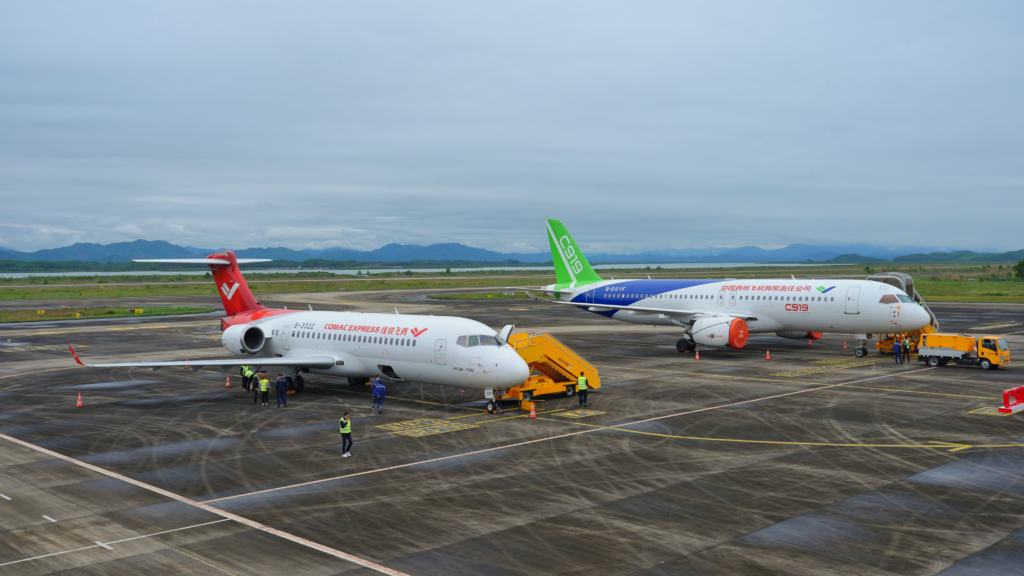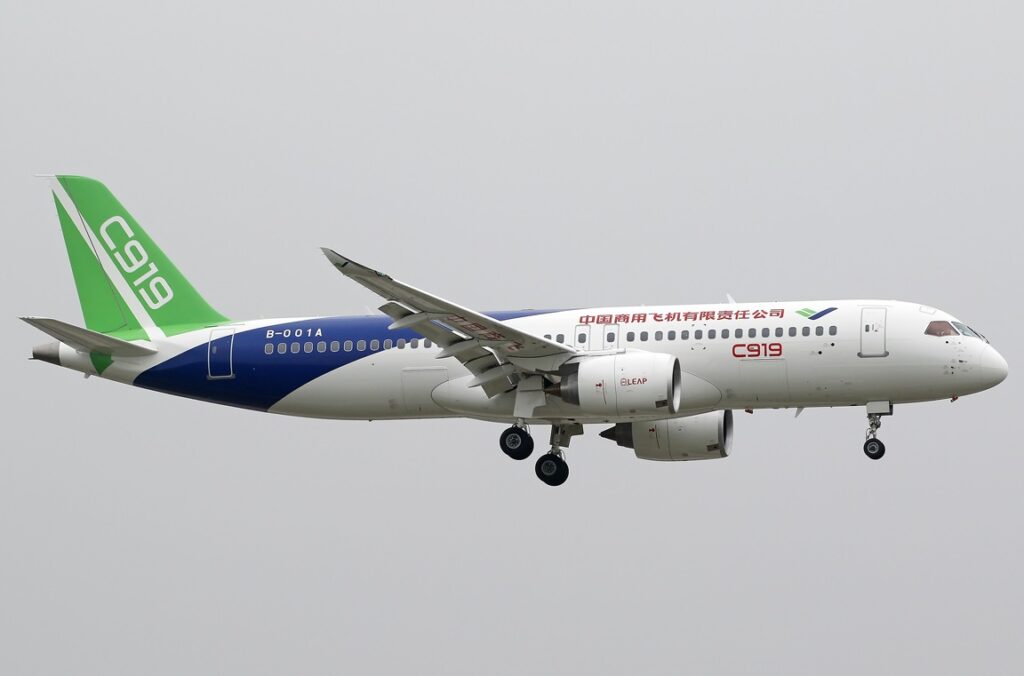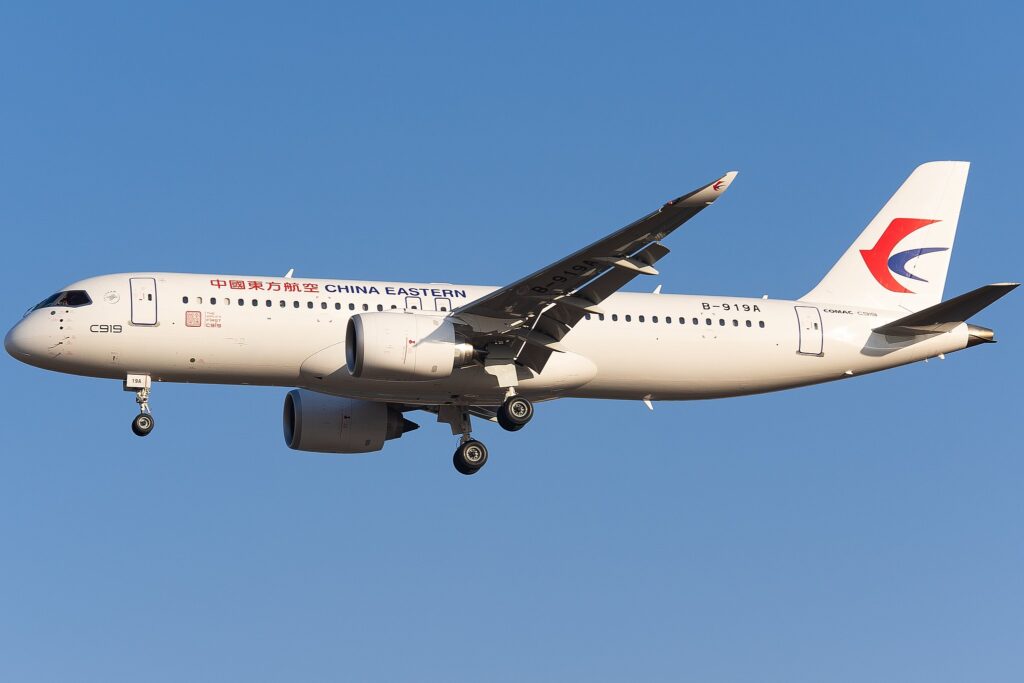WASHINGTON- China’s state-owned aircraft manufacturer COMAC is encountering industry doubt regarding its assertions that its latest passenger plane, the C919, can disrupt the duopoly of Boeing and Airbus in the passenger jet market.
As per China’s official Xinghua news agency, COMAC wrapped up its promotional campaign in Malaysia on Wednesday after touring the burgeoning aviation markets of Singapore, Vietnam, Laos, Cambodia, and Indonesia. During the tour, the Shanghai-headquartered company presented its C919 aircraft to potential buyers at every location, portraying it as a reliable alternative to the Airbus 320 and Boeing 737.

Eyes Expansion in Southeast Asia
Analysts predict that international and regional tourism will rebound to pre-pandemic levels and surpass them in numerous Southeast Asian nations this year. However, they caution that sustained growth may rely on a complete recovery of China’s economy.
According to Chinese state media, the Commercial Aircraft Corporation of China (COMAC) anticipates a surge in demand for passenger aircraft in the Asia-Pacific region over the next twenty years, with numbers projected to rise from 3,314 to 9,701 planes.
However, according to Skift, a research site in the travel industry, the executive chairman of Air Lease, one of the largest aircraft lessors globally, stated that the company has no intention to acquire any C919 jets.
During the Wings Club event for the aviation industry in New York on February 29, Steven Udvar-Hazy remarked, “The CCP [Chinese Communist Party] and COMAC are highly interested in marketing the C919,” further emphasizing, “But it’s akin to a one-way dating relationship.”
Brendan Sobie, representing Sobie Aviation, a consultancy firm based in Singapore’s aviation industry, informed CNBC, “It’s too early to determine if COMAC can disrupt the duopoly. … We are unlikely to witness any significant overseas orders for the C919 in the near future.”
As the C919 tour progressed, COMAC conveyed its aim to showcase the aircraft and lay “the groundwork for future market expansion in Southeast Asia.”

C919: The Emerging Jet in Commercial Aviation
The C919 obtained certification solely from the Civil Aviation Administration of China, granted in September 2022. It commenced commercial operations with China Eastern Airlines in May of the previous year.
COMAC reports over 1,000 orders for the C919, predominantly from Chinese carriers and aircraft lessors.
During the Singapore Airshow, COMAC secured orders from Tibet Airlines, a Chinese entity, for 40 C919 single-aisle planes. Bloomberg notes that the Boeing and Airbus planes will be fully booked until the end of the decade.
China aims to attain broader international recognition for the C919 and intends to pursue certification from the European Union Aviation Safety Agency.
Despite being showcased outside China for the first time at the Singapore Airshow from February 20-25, Boeing and Airbus executives express minimal concern about the C919. Christian Scherer, CEO of Airbus’s aircraft commercial business, remarked during a media roundtable at the event that the C919 is “not going to rock the boat,” adding that it represents a legitimate effort by China but is “not very different” from Airbus and Boeing aircraft.
Dave Schulte, Boeing’s commercial marketing managing director for Asia-Pacific, indicated to Barron that Southeast Asian airlines might consider ordering C919s.
However, he cautioned that COMAC would encounter supply chain disruptions similar to those of Boeing and Airbus as the demand for air travel increases post-pandemic. Manufactured in China, the C919 heavily relies on components, including engines, sourced from companies outside China, such as GE and Honeywell International.

Order for ARJ21
After its Singapore showcase, COMAC brought the C919 to Vietnam for its own airshow from February 26-29, followed by a two-week series of shows in Laos, Cambodia, Malaysia, and Indonesia.
Tan Wan Geng, COMAC’s board chair, highlighted Vietnam’s significance as an international aviation hub in Southeast Asia and anticipated enhanced exchanges and collaboration between COMAC and Vietnam’s aviation industry.
During the Singapore event, Tibet Airlines ordered 10 ARJ21 jets, the smaller predecessor of the C919, while China’s Henan Civil Aviation Development and Investment Group ordered six ARJ21s.
Last week, Sinn Chanserey Vutha, Undersecretary of State and spokesman for Cambodia’s State Secretariat of Civil Aviation expressed Cambodia’s endorsement of the entry of C919 and ARJ21 jets into the aircraft market.
“This is a positive development for the aircraft market,” he conveyed to China’s official Xinhua while attending the demonstration flight event.
Nguyen Thien Thong, a prominent expert in aviation engineering in Vietnam, shared in a telephone interview with VOA Vietnamese on February 28 that it is improbable for airlines in Vietnam to procure or lease COMAC aircraft in the foreseeable future.
The founder of the Aviation Engineering program at Van Lang University elaborated that introducing another airline supplier alongside their existing fleets of Airbus and Boeing would complicate maintenance, management, and operations while inflating costs.
“I don’t see it as a viable option,” remarked the former head of the Aviation Engineering Department at Ho Chi Minh City University of Technology.
As reported by Skift, Udvar-Hazy, the Air Lease executive chairman, highlighted a lack of necessary support infrastructure for rendering the C919 commercially feasible in international markets. He further noted the absence of technical support training for the Chinese jet. “Without those elements,” he emphasized, “there’s no potential for an export market.”
Stay tuned with us. Further, follow us on social media for the latest updates.
Join us on Telegram Group for the Latest Aviation Updates. Subsequently, follow us on Google News.

